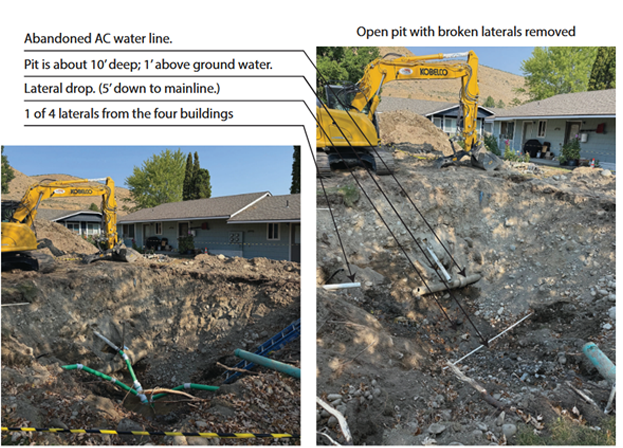Public Works Board announces $734,310 to emergency infrastructure failures
OLYMPIA, Wash. – The Washington State Public Works Board recently awarded $734,310 in emergency loans to the cities of Pateros and Wapato to address critical infrastructure failures threatening public health and safety.
In Pateros, located in Okanogan County, the sewer line that moves most of the city’s untreated sewage collapsed under two apartment buildings, creating a sinkhole and damaging building structures and nearby sidewalks. The apartments are home to low-income residents. The leak posed a groundwater contamination risk, prompting the city to declare a state of emergency on Sept. 11.
The PWB approved $305,000 in its Oct. 3 business meeting to help the city install a new, permanent sewer line and replace the damaged sidewalks.
“The collapsed sewer line has been a top priority for replacement at the City of Pateros and the new product will have an expected lifespan of 75 to 100 years,” project manager Jord Wilson wrote in a project memo.

In Wapato, a Yakima County community near the Yakima River, a power outage caused the blowers at the city’s wastewater treatment facility to fail, leading to a significant overload of solids. The emergency left the city with only the short-term option to haul waste off-site. The Wapato City Council ratified a declaration of emergency for this situation on Sept. 23.
The PWB awarded Wapato a $429,310 emergency loan so the city can replace the failed electrical equipment and evaluate long-term improvements to prevent future system failures.
Kathryn Gardow, chair of the Public Works Board, praised both cities for acting quickly. “This is what I call the PWB being responsive,” Gardow said.
Ed Stern, board member and deputy mayor of Poulsbo, emphasized the unique role the board plays in infrastructure emergencies. “This is a perfect example of how PWB remains the sole first responder for emergency infrastructure failure in the state,” Stern said. “Our ability to pivot and meet the need in short order is unparalleled.”
Applications for the PWB emergency and pre-construction funding programs remain open until funds are exhausted. As of October 2025, $6.8 million in emergency funding remains available for the 2025-27 biennium.